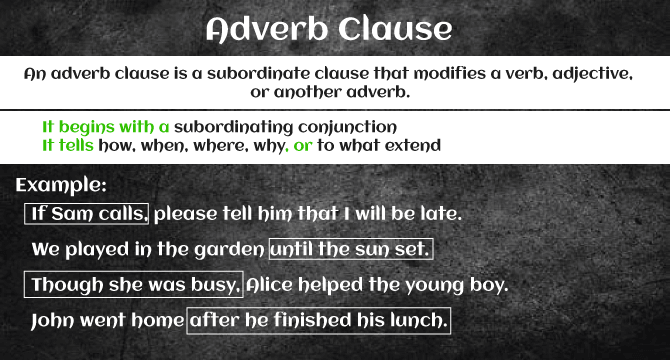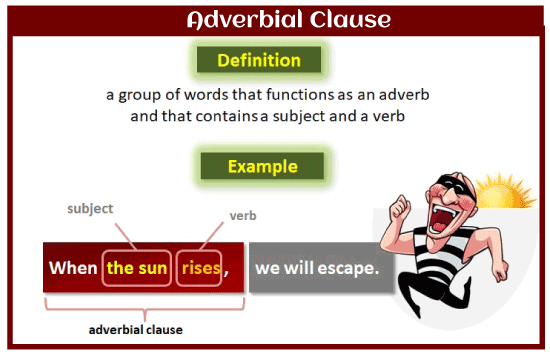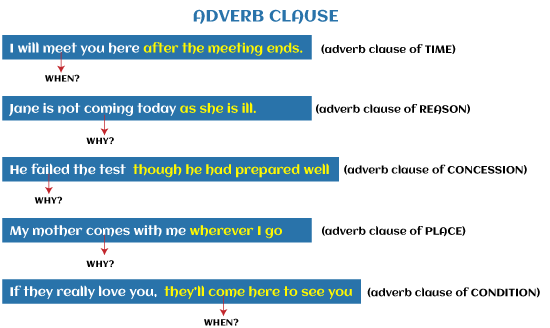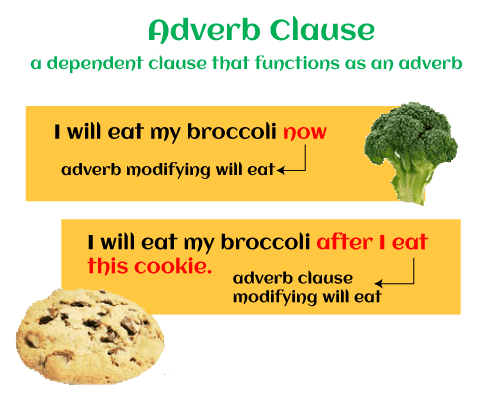Adverb ClauseWhat is an Adverb Clause?An adverb phrase is a set of terms in a sentence that operate as an adverb. Verbs, adverbs, and adjectives can all be modified or described by the phrase. Adverb clauses, mostly, offer details that explains when, where, why, how, how much, or under what conditions the action in the sentences occur. An adverb phrase is a set of terms in a statement that operates like adverb but lacks both the subject(s) and the verb(s). Subordinating conjunction, like "after," "if," "because," or "although," precedes an adverb phrase. On the other hand, an adverb clause is not just any sequence of words. To be complete, a clause must have a subject and a verb. 
An adverb clause, similar to all clauses, has a subject and a verb. An adverb clause, on the contrary, is a dependent clause. This implies that it can never stand alone as a sentence. An adverb clause, in particular, is a modifier that alters the independent clause. The following are the various components of the adverb clause: The subject of a sentence: It is the individual, location, idea, or thing that it is about. In a clause or sentence, it is the noun that does something. The precedent: In your statement, this is where the action is. It describes what the subject does and is frequently a verb, although it can also be a verb phrase (a verb with its objects or modifiers). The dependent 'marker' words/subordinating conjunctions: A dependent marker word (also known as subordinating conjunction) is a word that provides information such as time or context. The majority of adverbial clauses start with a subordinating conjunction. The object: This is the term in a phrase influenced by the verb or preposition, mainly nouns or pronouns that answer questions like 'who,' 'what,' 'where,' and 'when?' 
What Is an Adverb?The adverb is a word in the English language that characterizes the adjectives, another adverbs, or the verbs. Adverbs provide additional information on how an activity was carried out. In generally, they provide answers to queries such as how, why, where, and when. She moved slowly. (adverb) She walked like an elderly lady. (adverb phrase) She walked as if she was moving to the criminal cell. (adverb clause) In each of these sentence fragments, the bold term or group of words addresses the issue "how?" and explains the verb "walked." Definition of a ClauseA clause is a collection of terms that includes both the subjects and the verbs. This is distinct from a phrase, that lacks the subject and the verb. Making Use of Adverb ClausesIncluding an adverb clause in your sentence is an excellent method to add significant, descriptive depth and information to your writing. They are adaptable and can be used at the start, middle, or ending of a sentence, based on how they sound. Before going ahead, let us figure out the difference between phrase and clause. Clause vs. PhraseStudy the initially given instances of terms being used together to function as an adverb in a statement when discussing the distinction between phrases and clauses. He walked like an elderly woman. (phrase) He walked as if he was moving to the gallows. (clause) In the instances mentioned above," Like an elderly lady" doesn't have a subject or the verb. Thus, it is an adverb phrase. As a result, "as if he were moving to the gallows" includes the subject (he) and a verb (were moving), forming it the adverbial clause. 
Types of ClausesClauses could be either standalone or reliant on one another. Adverb clauses are not entire phrases like independent clauses. Dependent clauses, also called subordinate clauses, cannot function as entire sentences on their own. Dependent clauses include adverb clauses. They differ from other sorts of dependent clauses in that they serve as an adverb. The dependent clauses are bolded in the instances below, whereas the independent clauses are highlighted. Because she has a university diploma, she got a good career. When the storm rolled, Helen was at the supermarket. Riya wore a jacket that I gave her. Each dependent clause (in bold) comprises of the subject and the verb but does not form a coherent statement on its own. They are meaningless without an independent clause. The independent clauses (underlined) can function as grammatically full statements on their own; however, adding the dependent clauses adds more depth. What Is an Adverb Clause?Adverb clause is the dependent clause which operate as adverbs. These are also known as adverbial clauses. Adverb clause comprise of the subject and the verb and are used to describe adjectives, verbs, or another adverbs. Subordinating ConjunctionsSince adverb clauses are dependent clauses, these must be joined to the remainder of the phrase by a subordinating conjunction. Knowing how to distinguish subordinating conjunction will allow you to identify an adverb clause. The following are few instances of subordinating conjunctions. They are classified according to the sort of questions they reply to: when - after, when, until, soon, before, once, while, as soon as, whenever, by the time. Etc. how - if, whether or not, provided, in case, unless, even if, in the event and so on why - because, as, since, so, in order that, now that, in as much as where - wherever, where and so on. Comma Requirements for the clause positioningAdverb clauses can appear at the start, middle, or conclusion of a sentence. These need a comma to neutralize them from the remaining of the sentence, whether inserted at the onset or middle of the statement. There is no need for a comma, so when an adverb clause comes at the ending of a statement. The adverb clause and related punctuation are highlighted in the instances below.
Adverb Clauses Classified by Type and PurposeAdverb clauses frequently resolve where, when, why, and how inquiries in a phrase since they operate like adverbs. The instances below are sorted by the question the adverb clause answers. In each case, the adverb phrase is bolded for ease of recognition. 
Adverb Clauses That Respond to WhereAdverbial phrases frequently convey location information of an event. Whenever you're trying to demonstrate the position of anything, utilize this form of adverb phrase to be very precise on the exact location.
Adverb Clauses That Indicate WhenThe adverbial phrases that follow provide a response to the issue of when. These are useful when you wish to specify the time-period in which some-activity will, has, or is anticipated to occur. When describing time, use this form of an adverb clause.
Adverb Clauses That Indicate WhyThe following adverb clauses are instances of those that respond to questions why. When explaining the cause or goal of anything, employ this form of adverb clause, which together offer explanation or justification for the result.
Adverb Clauses That Explain HowThe adverb phrases that follow address questions, "How?" Broadly there are two types of clauses in this segment: conditional clauses and concessional clauses. Clauses of condition state what must take place in order for anything to occur, whereas clauses of concessions describe what has happened despite a context that would appear to imply that a different result should have happened.
Adverb Clauses Provide Extensive DetailAlthough adverb clauses are somewhat more involved than solo adverbs, they can help you increase more context to your text by describing how and why things occur. When you start using subordinating conjunctions and dependent clauses in your writings, you add interest by changing the rhythm of your statements. Adverb clauses help to build a comprehensive image for the reader by layering vital information. Examine adverb clause instances to gain a sense of the various ways these descriptors might be applied to enhance your writing. Popular adverb clause mistakesAdverb clauses can be tough to employ at times. Therefore, it's crucial to be aware of the most typical errors. You can prevent making foolish mistakes this way.
An adverb clause, just like all the other clauses, which necessarily comprise of both the subject and the verb. If you exclude the verb, you get a phrase rather than a sentence. Adverb clauses must always satisfy three criteria:
Adverb Clause InstancesYou'll see how these helpful phrases change other terms/expressions by offering important information regarding the location, timing, manner, surety, frequency, or other conditions of the action signified by the verbs or verb phrases in the statements when you read the examples below. While adverb clauses are significantly more complex than plain adverbs, they are worthwhile to study. The adverb clauses in these examples are highlighted to make them easier to identify.
Next TopicAdverb Examples
|
 For Videos Join Our Youtube Channel: Join Now
For Videos Join Our Youtube Channel: Join Now
Feedback
- Send your Feedback to [email protected]
Help Others, Please Share










